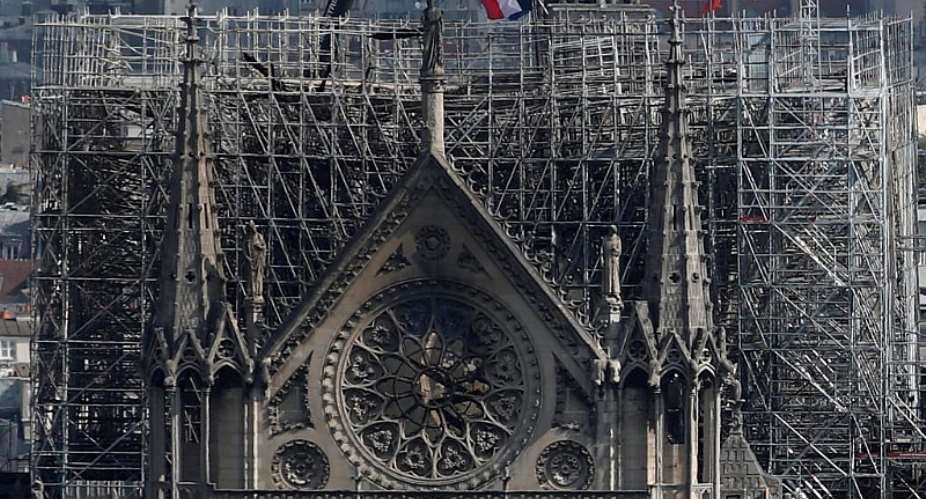Wealthy French families have pledged enormous donations to rebuild Paris's damaged Notre-Dame cathedral, making themselves eligible for tax breaks that would mean hundreds of millions of euros in lost revenue for French public services.
Less than two days after a fire damaged the roof and spire of the Notre-Dame cathedral in Paris, donations for rebuilding efforts had reached 880 million euros, according to President Emmanuel Macron's cultural heritage envoy.
Of that amount, 500 million was pledged by three of France's wealthiest families, all owners or main shareholders of the world's largest luxury goods and cosmetics companies.
The Arnault family, which owns the LVMH luxury conglomerate, pledged 200 million euros, as did the Bettencourt-Meyers family, heirs to the L'Oréal cosmetics fortune.
And the Pinault family, owners of luxury group Kering promised 100 million euros through holding company Artemis.
Other donors among France's wealthiest people include Martin Bouygues and Marc Ladreit de Lacharrière, who each pledged 10 million euros.
French companies also announced large donations, including oil giant Total (100 million euros), advertising giant Decaux (20 million) as well as Michelin, Capgemeni, Crédit agricole and Vinci.
From abroad, Apple and the European Central Bank pledged contributions to the reconstruction fund.
What the law says about tax breaks on donations
Under French fiscal law, these pledges make their donors eligible for deductions in taxes owing to the public coffers.
Individuals donating to reconstruction efforts are eligible to write off 66 percent of amounts of donations in their tax owed, as long as the donation does not exceed 20 percent of their taxable earnings.
Companies, including holding companies of the largest donors, would benefit from a 2003 law allowing companies to reduce their taxes owing by 60 percent of the amount of their donations, if those donations do not exceed 0.5 percent of their revenue in France.
When it comes to large conglomerates or industrial groups that routinely post tens of billions of euros in annual revenue, the amounts eligible for tax breaks easily reach into the hundreds of millions of euros.
In a purely hypothetical example, 60 percent tax breaks applied to 500 million euros' worth of donations would translate to 300 million euros of lost revenue for French public services.
'Billionaires want to pass for heroes'
Some politicians said wealthy donors would do better to protect France's heritage by paying their taxes, in reference to huge tax breaks available on the donations.
“We can't make preserving our heritage into a big communications operation like some are doing,” said Manon Aubry, who is heading the European election campaign for the left-wing France Unbowed movement.
“The billionaires want to pass for heroes,” said Green party senator Esther Benbassa. “They would do better to cease avoiding paying taxes.”
Similar remarks came from some of the self-appointed spokespersons of the Yellow Vest movement, which has largely been driven by the perception of a system of laws and policies that benefit a tiny elite at the expense of the majority of the population.
“I want us to return to reality,” said Ingrid Levavasseur, citing “growing anger on social networks” against “big companies that are passive when it comes to social misery but which prove themselves capable of finding a ridiculous amount to money in one night for Notre Dame”.
“It's good the oligarchy is donating for Notre-Dame. Setting an example with taxes would be better. A good conscience does not hide misery and austerity,” said Benjamin Cauchy, a Yellow Vest protester who is running in European elections with the right-wing sovereignist party Debout La France.
Defence and a renunciation
Some officials defended the donors from such criticisms, however.
The Notre-Dame fire “is a moment of national unity,” retorted Geoffroy Roux de Bézieux, president of the Medef union of business leaders. “The controversies are pathetic.”
“I don't want us to point the finger at the big donors,” said Christian Estrosi, mayor of the city of Nice and member of the right-wing Les Républicains party. “The big donors are heads of industry, heads of companies, creators of thousands of jobs in our country.”
One major donor, however, announced Wednesday it would renounce the 60 percent tax break on its 100 million euro donation.
“The family will not apply the fiscal advantage eligible to it for this donation,” said a statement issued by the Pinault family's holding company Artemis.
The statement added the Pinault family believed “there was no question of shifting the burden to French taxpayers.”
It was not immediately clear if other donors would follow their example.





 TUC tells informal sector employers to pay their employees the minimum wage
TUC tells informal sector employers to pay their employees the minimum wage
 Prof. Marfo urges good civilian-security relations to promote peace
Prof. Marfo urges good civilian-security relations to promote peace
 I was nearly jailed because of NPP; I’m still ‘pained’ — Hopeson Adorye
I was nearly jailed because of NPP; I’m still ‘pained’ — Hopeson Adorye
 Rising against NPP after being a minister for 15 years is a sin; God will judge ...
Rising against NPP after being a minister for 15 years is a sin; God will judge ...
 Cecilia Dapaah: Reasons behind AG’s advice to EOCO not grounded in law – Martin ...
Cecilia Dapaah: Reasons behind AG’s advice to EOCO not grounded in law – Martin ...
 NPP should have reported Kingsley Nyarko’s conduct to police – Inusah Fuseini
NPP should have reported Kingsley Nyarko’s conduct to police – Inusah Fuseini
 Akufo-Addo cuts sod for MIIF Technical Training Centre
Akufo-Addo cuts sod for MIIF Technical Training Centre
 NPP didn’t struggle to win Ejisu by-election – Samuel Ayeh-Paye
NPP didn’t struggle to win Ejisu by-election – Samuel Ayeh-Paye
 A/R: Achiase Chief arrested for acid attack on community members
A/R: Achiase Chief arrested for acid attack on community members
 Naa Ayemoede returns to school
Naa Ayemoede returns to school
